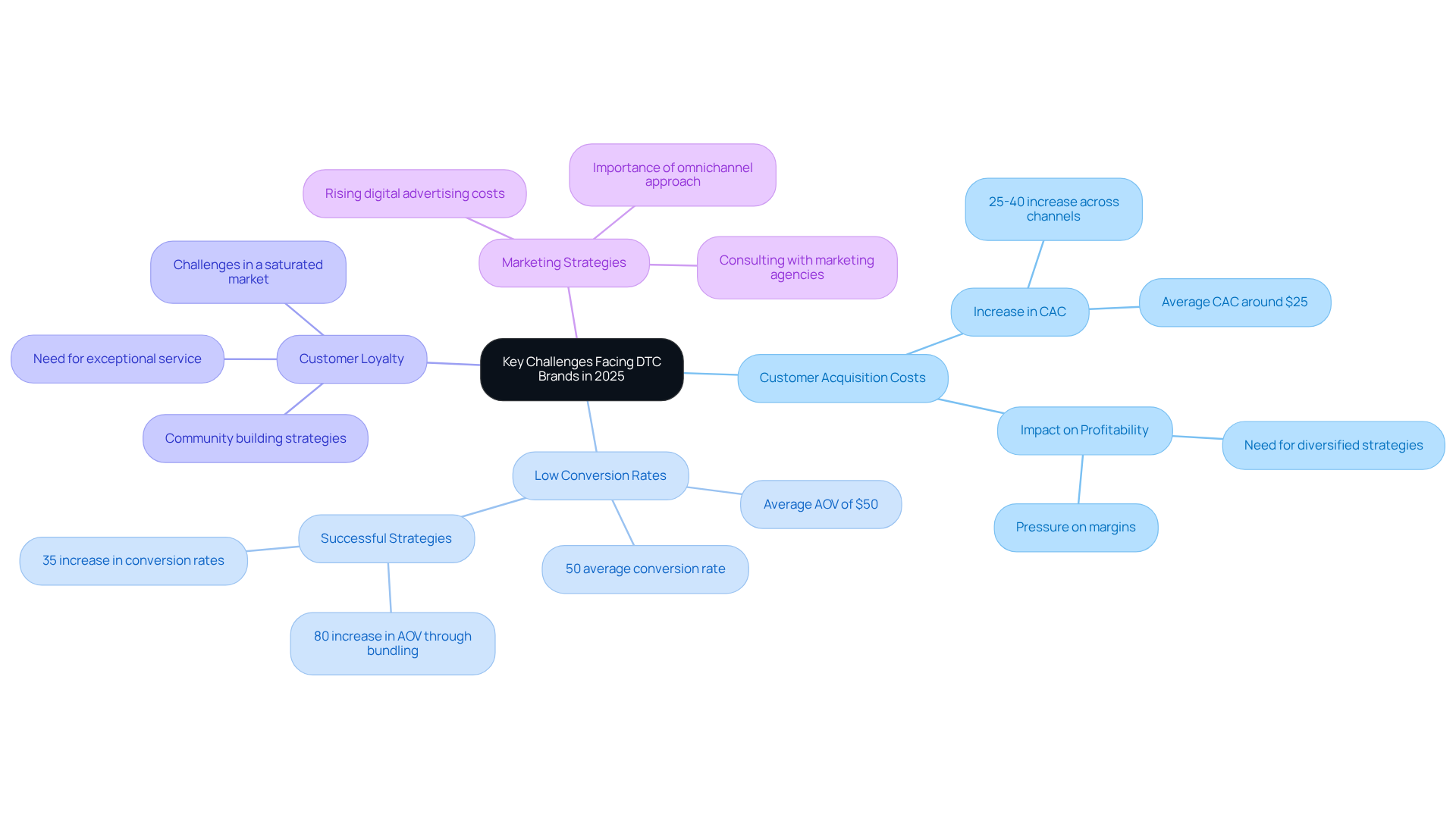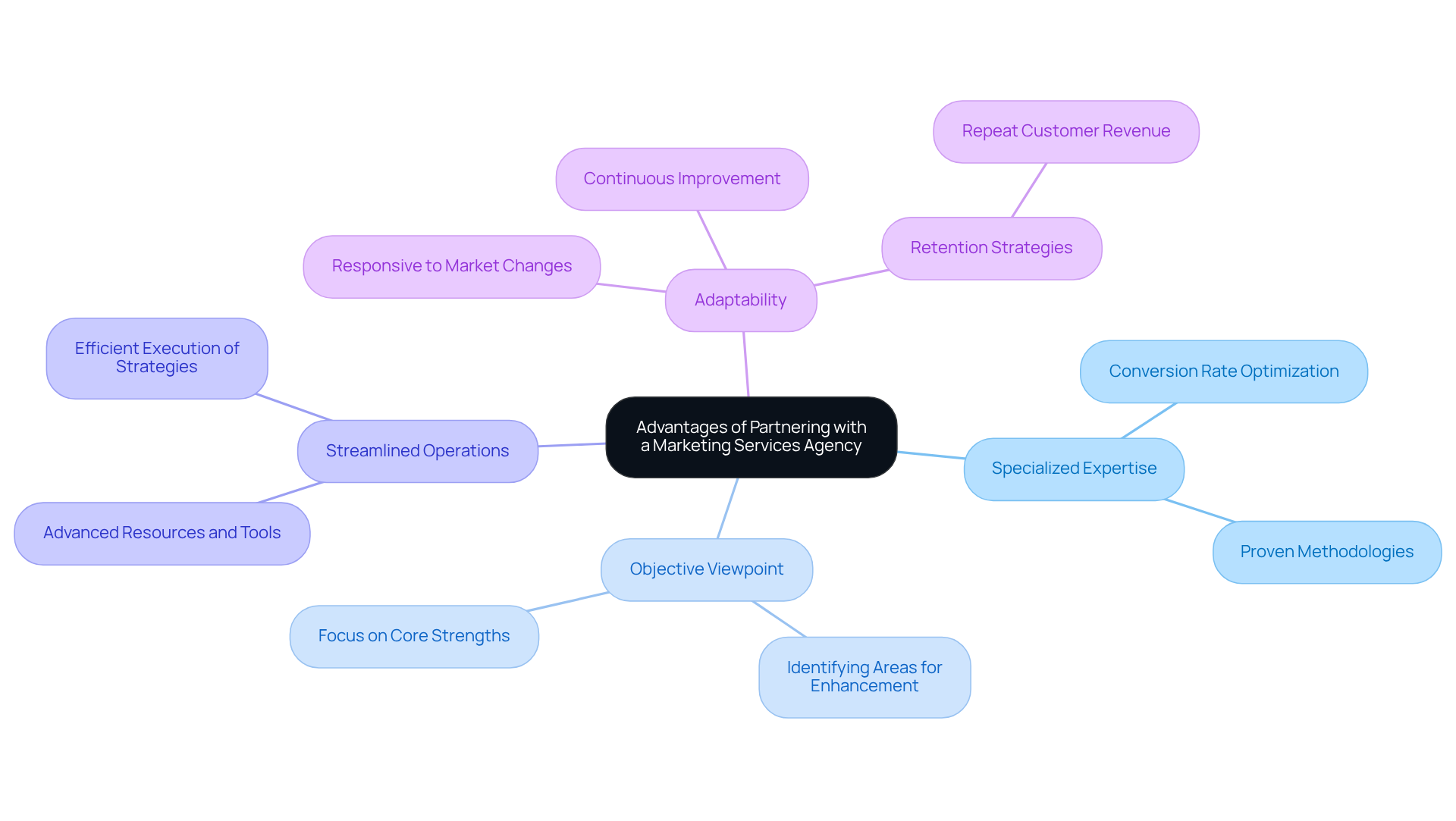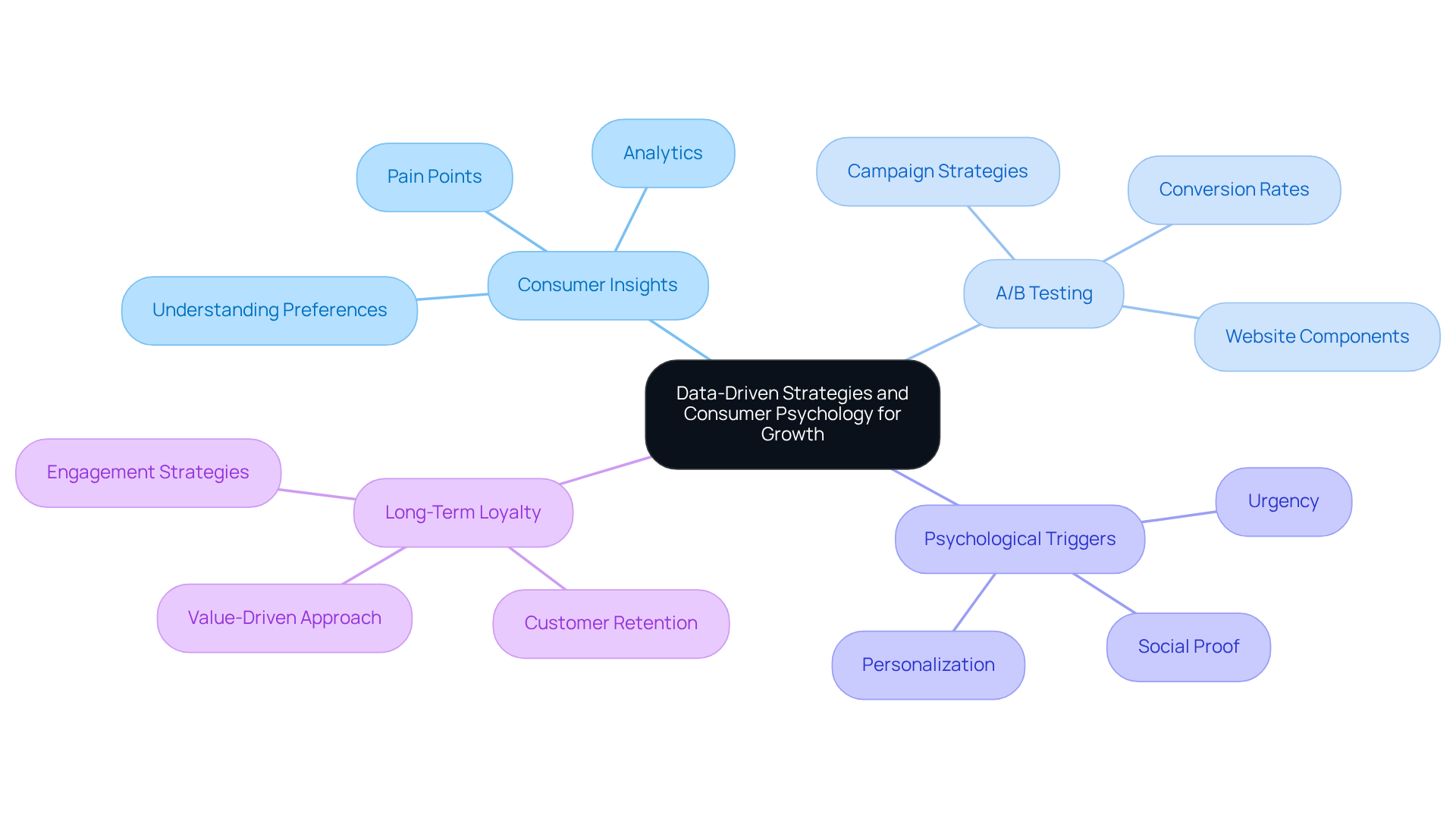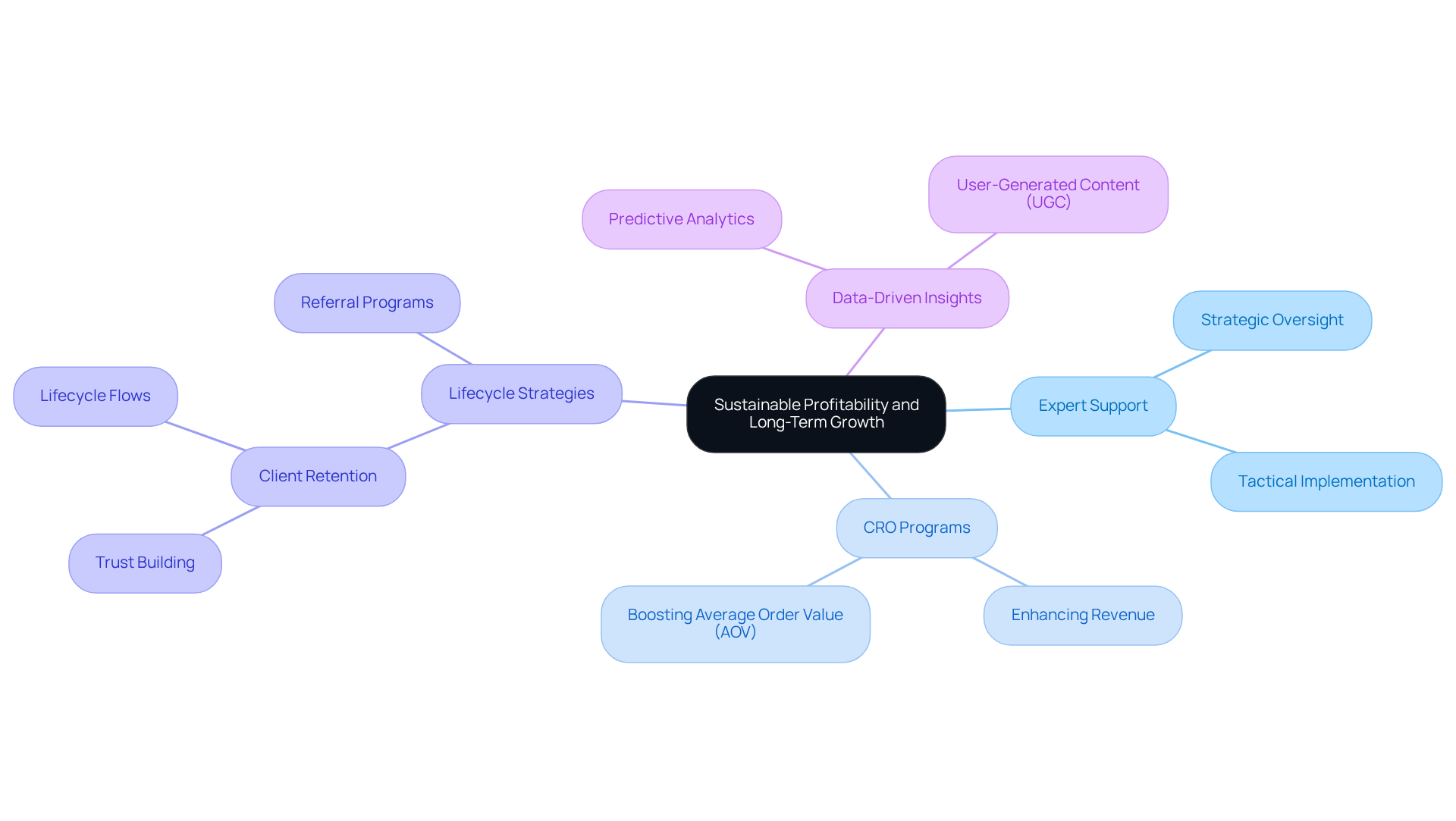
Overview
DTC brands urgently require a marketing services agency for growth, driven by soaring customer acquisition costs and the intricate task of optimizing conversion rates in a fiercely competitive landscape.
Agency partnerships deliver specialized expertise and data-driven strategies, empowering brands to elevate their marketing effectiveness, bolster customer retention, and ultimately secure sustainable profitability.
By leveraging these partnerships, brands can navigate the complexities of the market with confidence, ensuring they not only survive but thrive in today's challenging environment.
Introduction
As the landscape for direct-to-consumer (DTC) brands becomes increasingly competitive, the challenges they face in 2025 are formidable. Customer acquisition costs are soaring, and conversion rates are stagnating, compelling these companies to rethink their marketing strategies to maintain growth and profitability.
This article delves into the critical role that marketing services agencies play in helping DTC brands navigate these complexities. These agencies offer specialized expertise that can transform obstacles into opportunities.
How can these partnerships revolutionize the way DTC brands engage with consumers and drive sustainable growth in an ever-evolving marketplace?
Identify the Key Challenges Facing DTC Brands in 2025
In 2025, DTC companies confront significant challenges that jeopardize their growth and profitability. Foremost among these is the steep rise in customer acquisition costs, which have surged by 25% to 40% across various channels, complicating the path for companies to thrive. As competition intensifies, digital advertising expenses are escalating, prompting a reevaluation of promotional strategies.
Despite attracting considerable traffic, many DTC companies grapple with low conversion rates, averaging around 50% AOV, indicating that hefty marketing investments are not yielding proportional sales. Moreover, fostering customer loyalty in a saturated market is increasingly difficult, as consumers are overwhelmed with choices and demand exceptional service. This scenario underscores the urgent need for DTC companies to optimize their existing resources and strategies.
Collaborating with a marketing services agency can provide the necessary expertise to navigate these complexities, enabling companies to focus on sustainable growth rather than merely surviving in a competitive environment. For example:
- [Parah Group](https://parahgroup.com) aided a $30M apparel company in enhancing its conversion rate by 35% and revenue per visitor by 10% through strategic homepage redesigns and optimized pricing.
- A $15M cleaning product company witnessed an 80% increase in average order value by implementing bundles and free shipping thresholds.
These real-world instances illustrate how companies can effectively and strengthen their market position. As Brandon Warren aptly notes, "Customer Acquisition Costs (CAC) put serious pressure on profitability," emphasizing the imperative for companies to adapt.
Furthermore, with 63% of respondents prioritizing CAC as a KPI, it is evident that tackling these financial pressures is crucial for long-term success. A comprehensive strategy is essential, empowering companies to diversify their promotional methods in response to rising CAC.

Explore the Unique Advantages of Partnering with a Marketing Services Agency
Collaborating with a marketing services agency offers DTC companies unique advantages that can significantly enhance their growth trajectory.
Firstly, these agencies bring specialized expertise and extensive experience in conversion rate optimization, allowing companies to leverage proven methodologies that yield tangible results. Research shows that doubling conversion rates is often more feasible than doubling traffic, underscoring the power of targeted optimization strategies.
Secondly, agencies provide an objective viewpoint, pinpointing areas for enhancement that internal teams might overlook. By entrusting promotional activities to a marketing services agency, companies can focus on their core strengths while benefiting from advanced resources and tools provided by the agency.
This partnership not only streamlines operations but also accelerates the execution of data-driven strategies, which can lead to improved conversion rates and higher average order values. Notably, 60% of revenue for DTC companies is generated from repeat customers, highlighting the critical role of retention strategies in agency collaborations.
Ultimately, this alliance fosters a more to product promotion, enabling companies to respond swiftly to market changes and consumer trends. Continuous improvement by dedicated teams ensures that promotional strategies remain effective and competitive, further amplifying the impact of such partnerships, as many DTC companies report significant growth and enhanced customer engagement through agency collaboration.

Leverage Data-Driven Strategies and Consumer Psychology for Growth
In the competitive landscape of DTC promotion, harnessing data-driven strategies alongside consumer psychology is essential for driving growth. Agencies, such as a marketing services agency like Parah Group, employ sophisticated analytics to gain insights into consumer behavior, preferences, and pain points. This comprehension enables companies to customize their marketing messages with the help of a marketing services agency and improve user experiences, ensuring they connect with their target audience.
For instance, A/B testing can identify which website components or campaign strategies yield the highest conversion rates, allowing companies to make informed adjustments that enhance performance. Furthermore, leveraging psychological triggers—such as urgency, social proof, and personalization—empowers companies to create compelling narratives that motivate consumer action.
This strategic focus not only enhances immediate sales but also cultivates , positioning it as a vital element of sustainable growth. Notable DTC companies have successfully implemented these principles, demonstrating that a deep understanding of consumer psychology can lead to significant improvements in engagement and profitability.

Achieve Sustainable Profitability and Long-Term Growth with Expert Support
For DTC companies, achieving sustainable profitability and long-term growth hinges on expert assistance from a marketing services agency. These agencies provide critical strategic oversight and tactical implementation, enabling companies to navigate the complexities of a competitive marketplace, particularly in light of rising client acquisition costs (CAC). By deploying high-velocity conversion rate optimization (CRO) programs, companies can unlock substantial growth potential without incurring additional advertising expenses. This approach not only enhances immediate revenue but also establishes a robust foundation for future success.
Agencies prioritize long-term client success, ensuring that strategies are proactive rather than reactive. This forward-thinking approach anticipates market trends and consumer demands, empowering DTC companies to cultivate a loyal customer base. For instance, companies that effectively implement lifecycle strategies can enhance client retention, with research showing that a modest 5% increase in retention can lead to profit surges of 25% to 95%. Additionally, lifecycle promotion underscores the importance of trust, which significantly impacts client loyalty and retention.
Moreover, by leveraging data-driven insights, agencies help companies boost their average order values (AOV) and conversion rates. Successful DTC brands, such as Gymshark and Glossier, exemplify how community-building and personalized promotion can drive organic growth and foster loyalty. These brands have effectively harnessed user-generated content (UGC) to build trust and cultivate loyalty, which is increasingly essential in an environment of escalating customer acquisition costs.
Ultimately, collaborating with a marketing services agency provides DTC brands with the tools and expertise necessary to , ensuring they not only survive but flourish in the long run.

Conclusion
In the rapidly evolving landscape of 2025, DTC brands confront formidable challenges that jeopardize their growth and profitability. The surging customer acquisition costs, coupled with low conversion rates and the difficulty of nurturing customer loyalty, underscore the urgent necessity for these companies to adapt and optimize their strategies. Partnering with a marketing services agency emerges as a critical solution, providing the expertise and resources essential to navigate these complexities and concentrate on sustainable growth.
Collaborating with a marketing services agency not only boosts conversion rates but also offers a fresh perspective on internal strategies. By harnessing data-driven insights and consumer psychology, these agencies empower DTC brands to develop targeted marketing messages and execute effective retention strategies. Real-world examples demonstrate how strategic partnerships can yield substantial improvements in average order values and customer engagement, ultimately propelling growth in a competitive landscape.
As DTC brands grapple with escalating acquisition costs and an increasingly saturated market, embracing the support of marketing services agencies is not merely advantageous—it is vital for survival and success. By prioritizing long-term strategies and adapting to consumer demands, brands can cultivate loyalty and attain sustainable profitability. The time to act is now; investing in expert marketing partnerships will pave the way for DTC brands to thrive amid the challenges of 2025 and beyond.
Frequently Asked Questions
What are the key challenges facing DTC brands in 2025?
DTC brands in 2025 face significant challenges, including a steep rise in customer acquisition costs (CAC) by 25% to 40%, low conversion rates averaging around 50% AOV, and difficulties in fostering customer loyalty in a saturated market.
How have customer acquisition costs changed for DTC companies?
Customer acquisition costs for DTC companies have surged by 25% to 40% across various channels, complicating their growth and profitability.
What issues do DTC companies face regarding conversion rates?
Many DTC companies are struggling with low conversion rates, which average around 50% AOV, indicating that their substantial marketing investments are not translating into proportional sales.
Why is customer loyalty a challenge for DTC brands?
Customer loyalty is challenging for DTC brands because consumers are overwhelmed with choices and demand exceptional service, making it difficult for brands to stand out in a saturated market.
How can DTC companies improve their marketing strategies?
DTC companies can improve their marketing strategies by collaborating with a marketing services agency to navigate the complexities of rising CAC and optimize their existing resources.
Can you provide examples of DTC companies that successfully addressed these challenges?
Yes, for example, Parah Group helped a $30M apparel company enhance its conversion rate by 35% and revenue per visitor by 10% through strategic redesigns. Additionally, a $15M cleaning product company saw an 80% increase in average order value by implementing bundles and free shipping thresholds.
What is the significance of customer acquisition costs as a KPI for DTC brands?
Customer acquisition costs are prioritized by 63% of respondents as a key performance indicator (KPI), highlighting the importance of addressing these financial pressures for long-term success.
What is essential for DTC companies to achieve sustainable growth?
A comprehensive strategy that empowers companies to diversify their promotional methods in response to rising CAC is essential for achieving sustainable growth.
FAQs











